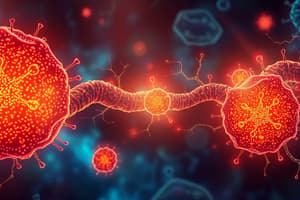Podcast
Questions and Answers
What characterizes a malignant tumor compared to a benign tumor?
What characterizes a malignant tumor compared to a benign tumor?
- It may spread to other parts of the body. (correct)
- It is always smaller than a benign tumor.
- It is weaker than a benign tumor.
- It does not spread.
Which nutrient deficiency is primarily associated with the disease Rickets?
Which nutrient deficiency is primarily associated with the disease Rickets?
- Vitamin C
- Iron
- Protein
- Vitamin D and Calcium (correct)
What is the main outcome of anaerobic respiration compared to aerobic respiration?
What is the main outcome of anaerobic respiration compared to aerobic respiration?
- It produces more energy.
- It occurs in muscle cells during intense activity. (correct)
- It generates lactic acid as a byproduct. (correct)
- It requires oxygen.
Which of the following is a common symptom associated with Anemia?
Which of the following is a common symptom associated with Anemia?
Which of the following statements about diabetes is true?
Which of the following statements about diabetes is true?
Flashcards
Benign Tumor
Benign Tumor
A tumor that stays in one place and isn't harmful.
Malignant Tumor
Malignant Tumor
A tumor that can spread to other parts of the body.
Rickets
Rickets
A disease caused by a lack of Vitamin D or Calcium.
Cancer
Cancer
Signup and view all the flashcards
Scurvy
Scurvy
Signup and view all the flashcards
Study Notes
Cancer
- Definition: A mutation in a gene controlling cell division, causing cells to divide abnormally, resulting in a tumor.
- Benign Tumor: Stays in one place, weaker.
- Malignant Tumor: May spread, stronger.
- Treatment: Chemotherapy, radiation therapy.
Aerobic and Anaerobic Respiration
- Aerobic Respiration: Requires oxygen.
- Path: Oxygen inhaled through nose/mouth, down trachea and bronchi, into alveoli. Diffuses into bloodstream, carried to heart, right atrium, then to working muscles via arteries.
- Anaerobic Respiration: Does not require oxygen.
Diet and Health
- Diet impacts health significantly.
- Deficiency diseases: Diseases caused by nutrient deficiencies.
- Examples: Rickets, Anemia.
- Symptoms of deficiency diseases include: Soft bones, tiredness.
- Food sources of nutrients: Fish, red meat, eggs, broccoli, orange.
Non-Communicable Diseases
- Definition: Diseases that cannot be transferred or spread from one person to another.
- Examples: Diabetes, Cancer, Stroke, AIDS.
- Cancer: Can be a result of poor diet or malnutrition, leading to nutrient deficiencies.
Studying That Suits You
Use AI to generate personalized quizzes and flashcards to suit your learning preferences.




